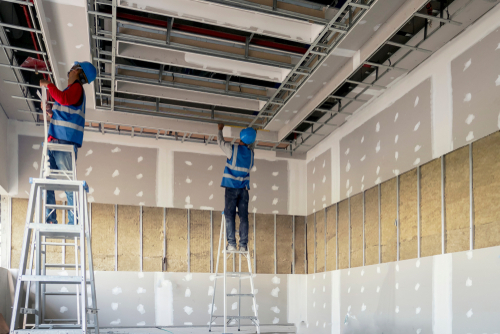
How To Start A Drywall Business
Table of Contents
How To Start A Drywall Business
Statistically speaking, you could make the argument that the drywall business is one of the more cost-efficient parts of the construction industry to get into. You’re always going to have work, and unlike a lot of other areas of construction, you’re not required to use a lot of heavy-duty equipment that could be difficult to manage financially at the start.
However, this doesn’t mean that the world of drywall doesn’t come without its quirks, and when you opt to start your own business in any construction field, there are general concerns that you also need to address. So, with that in mind, here are the key points to consider when approaching how to start a drywall business.
The Fact On How To Start A Drywall Business
Before going into how to start a drywall business, it’s important to talk about what qualifications you need to work with drywall in the first place. This begins with getting your training and license to enter the drywall industry. Requirements to enter your initial training vary. Some programs require a high school diploma or GED, while others do not. High-school-level math and shop courses are good foundations for the basis of drywall installation. Vocational programs are also great for getting more formal training.
Unlike some other construction industries, you don’t need a bachelor’s degree to break into drywall. However, if business ownership is your goal, it may be a good idea to pursue a business degree in order to learn more about that side of the operation. This can include basic business theory, accounting, mathematics, and other information.
In terms of training, you generally have two options: training on the job or getting a formal apprenticeship. On-the-job training generally lasts a year, and lets you get basic experience in the field. With that said, if you want to start a drywall business, a formal apprenticeship is generally the way to go. This generally provides more in-depth training, including learning how to read blueprints and understand building codes. This also helps your networking a bit, all of which is essential if you want to become a contractor yourself.
The final step is getting your drywall contractor’s license. Because the different rules for each state can vary so vastly, you want to look at what you need to do before you begin your training. In some cases, you may need to complete a formal program and pass an exam. In others, you can qualify after a certain duration as a journeyman drywall professional.

Creating A Drywall Business
So, let’s stay that you’ve gone to the effort to get the training, and you are a licensed drywall professional. What goes into making that experience the foundation for a successful drywall business?
For one thing, you want to make sure your license applies to a contractor business and their team, rather than an individual contractor. There can be a difference. For example, in Alaska, you need liability insurance, worker’s compensation, and a surety bond of $5,000. Every state is different, so you want to be prepared ahead of time. Some even require separate licenses for residential and commercial drywall. In addition, you may need other insurance. Property insurance will help protect you and your client’s property while you are working. In addition, commercial automotive insurance will be required to protect your work vehicles when they are out on the road.
The next thing that you want to look into is deciding what types of clients you are going to focus on. One of the first rules of business is that you can’t be all things to all people, and that applies to drywall as well. Most companies decide early on whether they want to focus on residential or commercial drywall. Making this distinction makes it easier to buy the gear that you need, as well as narrow down your marketing efforts. There are pros and cons to each option. For example, commercial drywall jobs may not be as common but allow for larger jobs, as well as recurring work. By comparison, most homeowners only need drywall every now and again, but there are more homes to work with.
Equally important as a drywall business owner is your crew and your gear. In terms of your crew, drywall installation generally requires more than one person, even for the smaller jobs, so you want to start looking at professionals to work with. People you may have met during your training is a good place to start. If you opt to use subcontractors, make sure you have a payment plan (hourly vs. project-based pay) in place.
In terms of equipment, drywall contractors have it easier than most. They can buy a lot of their gear on a per-project basis, including:
- -Drywall (and a vehicle large enough to carry it, if needed)
- -A power drill/screw gun
- -Saws
- -Rotors
- -Sprayers to add the finish
These are only the basics. Depending on the job, you may need other equipment, so plan accordingly.

At this point, you have the platform to get started in the world of drywall. Your next steps are going to be increasing your client base as well as working to make your operation more efficient. Client expansion is mainly a marketing question, but when it comes to efficiency, you want to take a look at your logistics. As your operation grows in clients and services, it’s going to get harder and harder to keep track of things. The last thing you want is for your business to grow, only for its reputation to sink because you can’t maintain the same tier of quality.
How To Start A Drywall Business – Conclusion
An essential part of keeping your drywall business functioning this way is utilizing project management software like eSUB. This is the type of investment that’s useful for drywall contractors at every stage of business development. Early on, it provides an easy and neat way to store your financial records to make sure they are accurate. Later, using cloud storage means that all your on-site teams have easy access to information and directives from the office, which makes it easy to keep everyone on the same page.


